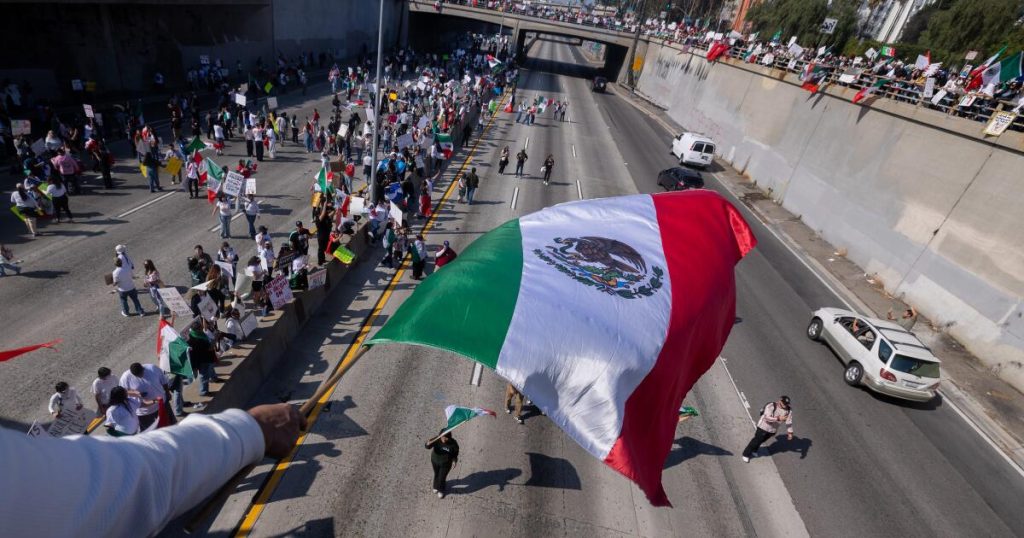A coalition of mostly left-leaning organizations in Southern California has vowed to disrupt immigration enforcement operations amid growing fears of large-scale raids by authorities. The groups, united under the name “Coalición de Autodefensa Comunitaria” (Community Self-Defense Coalition), announced their plans during a press conference outside federal immigration offices in downtown Los Angeles. The coalition, which consists of 60 organizations, aims to defend immigrant communities by mobilizing residents to surround and resist immigration agents during operations. Ron Gochez, a spokesperson for Unión del Barrio, one of the leading groups in the coalition, emphasized that the community is prepared to take action. “If it’s an apartment, a church, or any building, we’ll call on people to surround the location and stop them,” Gochez declared. The coalition plans to use megaphones, patrol neighborhoods, and distribute flyers to alert residents about immigration agents’ activities.
The announcement comes after leaked documents revealed that immigration authorities were planning enforcement operations targeting individuals without legal status or those with pending deportation orders before the end of February. The Trump administration has promoted a hardline stance on immigration, promising mass deportations, reopening Guantanamo Bay for detainees, and deploying military personnel along the southern border. However, no large-scale operations have been conducted in California, which is home to the largest immigrant population in the country. Despite this, activists have intensified their efforts to counter potential raids, with some groups patrolling immigrant neighborhoods and monitoring federal agents. “We’re putting them on notice,” Gochez said. “They’re not the only ones working right now. We’re organizing our community for self-defense.”
The leak of the documents has sparked a tense debate over immigration enforcement. U.S. Immigration and Customs Enforcement (ICE) officials have not commented on the leak, but Department of Homeland Security Secretary Kristi Noem criticized the FBI on social media, calling it “corrupt” in relation to the leak. ICE officials have confirmed that daily operations continue in California, primarily targeting criminals, but no arrest or detention figures have been released since Trump took office. Recent statistics show that ICE averaged over 900 daily arrests nationwide during the last week of January, up from around 350 weekly arrests during the final year of President Biden’s term. The Department of Homeland Security also reported deporting 7,300 people in the first week of Trump’s administration, a pace that would exceed the Obama administration’s deportation numbers but fall short of the peak levels seen under Trump’s previous term.
Community groups are not waiting for raids to occur before taking action. Organizations like the National Lawyers Guild-LA, Stop LAPD Spying Coalition, and the Association of Raza Educators are organizing rallies and preparing residents for potential enforcement actions. Some coalition members have already begun patrolling immigrant neighborhoods, following and recording federal agents when they are spotted. When agents are detected, the group uses megaphones to alert the community and distributes flyers with images of unmarked cars to help residents identify and avoid immigration officials. “We’re doing community patrols in the neighborhood before and after school,” said Lupe Carrasco Cardona, a member of the Association of Raza Educators. “We’re working with students and parents to create phone trees—not just to know your rights, but to defend your rights. Community self-defense is the key here.” Carrasco Cardona added that the efforts are driven in part by the fears of young people, who are worried about returning home to find their parents gone.
Another coalition, the Los Angeles Rapid Response Network (LARRN), which includes more than two dozen religious, labor, and immigrant rights groups, has established a hotline for reporting ICE activities and connecting individuals with legal assistance. The group is also working to combat misinformation, as fears of raids have led to a flood of rumors and unverified reports on social media. “We know that many people in our community are nervous, and we understand that many people post content on their social media pages with good intentions,” said Pedro Trujillo, organizing director for the Immigrant Rights Coalition, which is part of the network. “But we need to verify the information to avoid spreading panic.” LARRN and other groups are training volunteers to respond to tips and provide accurate information to the public.
The intensification of these efforts has drawn criticism from Trump administration officials, who argue that “sanctuary cities” and “know your rights” campaigns are hindering efforts to deport criminal immigrants. Tom Homan, Trump’s border czar, has complained that these initiatives are making it harder for agents to enforce immigration laws. Meanwhile, Wayne Cornelius, emeritus director of the Center for Comparative Immigration Studies at UC San Diego, has expressed skepticism about the impact of these community efforts. He noted that targeted enforcement strategies, such as workplace raids, might be more difficult for activists to disrupt than indiscriminate deportation campaigns. However, Cornelius also acknowledged that the Trump administration has yet to launch the kind of large-scale operations that are often resource-intensive and politically risky. “That hesitation may reflect concern that workplace raids could have significant negative impacts on local economies and communities, many of which are located in red states,” he said.
Despite these challenges, activists like Gochez remain determined, pointing to recent enforcement failures as evidence that their strategies are effective. For example, a raid in Aurora, Colorado, earlier this month targeting 100 members of the Tren de Aragua gang fell far short of its goals. Gochez and others argue that the frustration expressed by Trump officials like Homan is a sign that their tactics are working. As the debate over immigration enforcement continues to escalate, the Community Self-Defense Coalition and other groups are preparing for a long and contentious battle to protect immigrant communities in Southern California. Their efforts reflect a broader movement to resist Trump’s hardline immigration policies and ensure that immigrant families are not torn apart by deportation.









